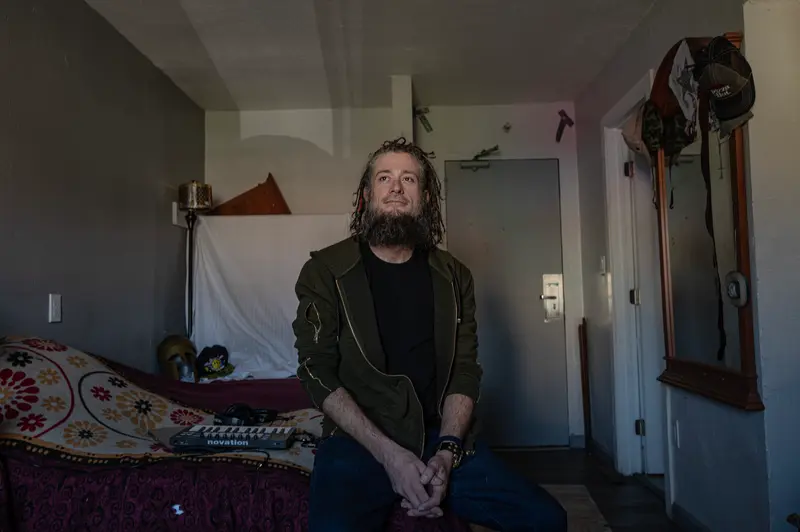This article was produced for ProPublica’s Local Reporting Network in partnership with Capital & Main. Sign up for Dispatches to get stories like this one as soon as they are published.
As part of Mayor Karen Bass’ signature homelessness initiative called Inside Safe, the city of Los Angeles awarded Las Palmas Hotel a contract potentially worth about $2 million to temporarily shelter people living on the streets.
But the 62-unit hotel in Hollywood was already supposed to be providing housing for people who couldn’t afford to live anywhere else under a 2008 city law meant to ease a “housing emergency” that has grown more severe in the past 15 years.
Inside Safe participants now fill most of Las Palmas’ rooms at nightly rates of up to $140, according to the hotel’s contract with the city — more than double the amount Las Palmas would likely earn if long-term residents rented the rooms as that law requires.
Las Palmas is one of eight residential hotels that have received contracts over the past year to house homeless people through the new Inside Safe program, a Capital & Main and ProPublica investigation found. Of those, five hotels including Las Palmas have collected city funding despite seemingly violating the housing ordinance by offering rooms to tourists.
LA’s struggle to preserve low-income housing while simultaneously trying to shelter the growing number of people living on the streets represents an increasingly common national problem as city leaders wrestle with the competing needs of different populations amid a limited housing supply.
Residential hotels, which offer basic single rooms sometimes with shared bathrooms, have long been a kind of last-resort housing for low-income, older and disabled people. The 2008 law bars landlords from turning their buildings into condos or tourist hotels unless they build new units or pay an equivalent fee to the city’s Affordable Housing Trust Fund.
Altogether, at least 18 residential hotels have turned into interim shelters through various homeless services programs since 2016, according to a review of the LA Housing Department’s residential hotel list, Inside Safe contracts, state awards for housing construction and a Los Angeles Homeless Services Authority database of interim housing sites.
Now, that number is set to grow as dozens more residential hotels could become temporary shelters. On Nov. 1, citing a “desperate need for interim housing,” Bass issued an executive order that allows Inside Safe or similar programs to use the city’s 16,000 residential hotel rooms in 300 buildings during the city’s declared homelessness emergency as long as the rooms are unoccupied.
Turning such permanent housing into temporary shelters only makes the city’s housing problems worse, said Barbara Schultz, director of housing justice at the Legal Aid Foundation of Los Angeles.
“It is inconceivable to me that the city would reduce the number of permanent units affordable to low-income people when we are in the middle of this ginormous housing crisis,” Schultz said.
Bass' press secretary Clara Karger said in an email that the mayor’s office decided that temporary housing is a better use of the rooms given LA’s housing crisis.
“It is troubling that residential hotels were being misused for daily rates and short-term vacation rentals,” she wrote. “Now, many of those rooms are being used to urgently bring people inside and save lives, and the mayor has directed the Housing Department to address enforcement and to conduct a comprehensive review of all residential hotels.”
This summer, Capital & Main and ProPublica reported that the Housing Department had done little to enforce the residential hotel law as 21 properties openly offered rooms to tourists on travel websites. Following a request by the mayor’s office, Housing Department managers investigated and issued citations to the owners of 17 hotels, including Las Palmas.
Pankaj Naik, CEO of Shivay Hospitality, which operates the hotel, declined to comment or answer questions. Las Palmas has appealed its citation and joined other hotels in a federal lawsuit against the city, alleging that residential hotel enforcement violates their constitutional protection against unreasonable searches. The owners also argue the city has given them tacit approval for short-term rentals by accepting nightly hotel tax payments. The lawsuit is ongoing.
The Housing Department told the mayor that with additional resources, the agency could “stop rogue property owners from violating the Residential Hotel Ordinance and undermining the availability of affordable housing stock.”
But now Bass’ office has removed hundreds of those same residential hotel rooms from the permanent housing market. And the Housing Department’s enforcement hasn’t stopped the city from giving the hotels hundreds of thousands of dollars in taxpayer money. Las Palmas’ Inside Safe contract expires in mid-November, but it provides for a six-month extension.
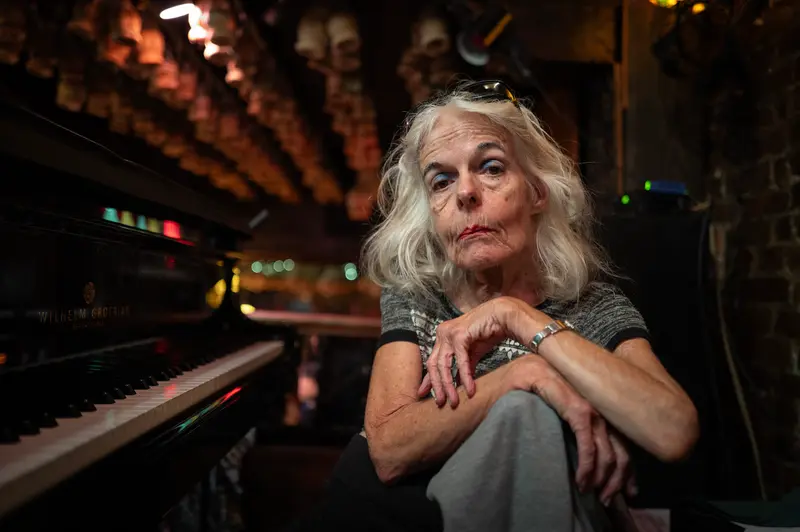
Under Inside Safe, which Bass launched shortly after taking office in December, city staffers target tent cities under bridges or on sidewalks. Outreach workers offer motel rooms while buses stand by to ferry those who accept the offers to their temporary dwellings. Once the encampment residents are gone, sanitation workers break up the camps, toss trash and hose down sidewalks.
The pressure on city leaders to bring people inside from street encampments is “immense,” said Gregg Colburn, a University of Washington real estate professor who studies homelessness. On any given night, an estimated 32,700 Angelenos live in cars, tents and makeshift shelters, and Bass promised to find housing for 17,000 of them in her first year.
“The problem with that strategy,” Colburn said, “is it doesn’t end homelessness. It recharacterizes it from unsheltered into sheltered, which is why I and many others argue we need a lot more permanent housing.”
Housing Enforcement, Then Lucrative Contracts
The Housing Department is supposed to approve any conversion of residential hotel buildings from permanent housing, but department records for 10 of the hotels obtained by Capital & Main and ProPublica didn’t show that permission was obtained to turn the hotels into temporary shelters.
The Housing Department did not provide all the hotel files that the newsrooms requested. It also didn’t respond to an interview request or answer emailed questions about whether it had cleared the hotels and what procedures they have for Inside Safe. Instead, the agency said it would handle the queries as a public records request.
Housing Department records revealed that inspectors had cited two of the Inside Safe properties for residential hotel violations in recent years. Hotel booking websites showed three others were openly renting rooms to tourists against Housing Department rules shortly before signing contracts with the city.
Las Palmas is a prime example. The hotel for years advertised its central location for travelers visiting Hollywood, capitalizing on its fame as the site of the final scene in the movie “Pretty Woman.”
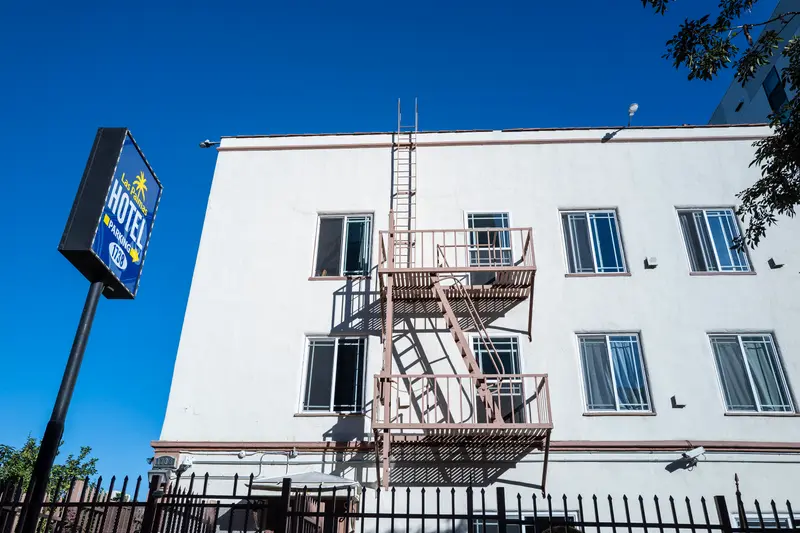
The Housing Department had designated Las Palmas as a residential hotel in 2011. It based its decision, in the Las Palmas case and others, on the state’s legal definition of a residential hotel: a building of six or more units that are the primary residences of their guests. During the period analyzed in 2005, hotel tax records showed that 93% of its occupants were permanent residents.
But as tenants moved away or died, the struggling actors, writers and celebrity impersonators who called Las Palmas home watched as their landlord turned more and more of the units into tourist rooms. The hotel’s website features a photo of the lobby with a mural of “Pretty Woman” stars Richard Gere and Julia Roberts reuniting on the building’s fire escape. The website promises visitors a “wonderful holiday” and a “blissful stay.”
Today, only about a dozen permanent residents remain, according to residents and the latest rent registry filed with the Housing Department.
As rents have soared, Las Palmas is the only housing most can afford, said writer John Bucher, 72. He got his third-floor room at the hotel 12 years ago “when there was still a payphone in the lobby.” Bucher has driven for Uber and DoorDash to supplement his income and can count on his adult kids to help him in an emergency. But for his neighbors, the hotel “is their safety net,” he said. “They’ll die here.”
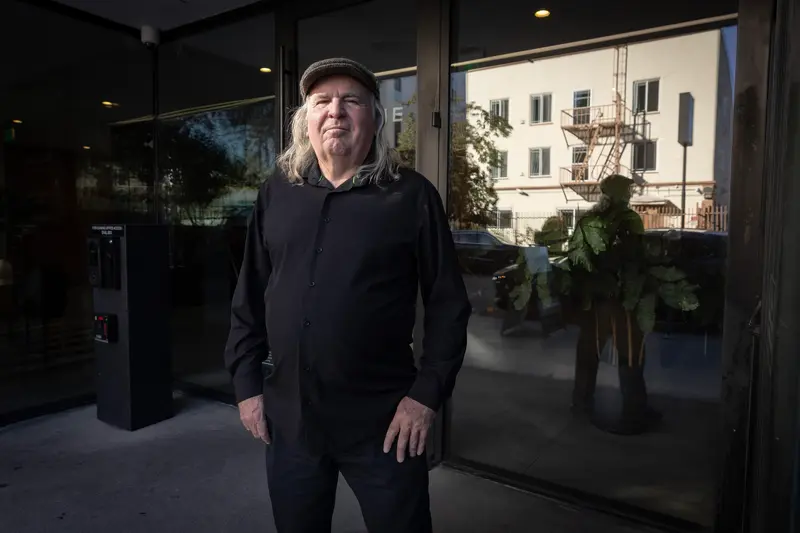
As Las Palmas turned into a tourist hotel, it did little to hide its marketing efforts. Outside was a large sign offering “DAILY” and “WEEKLY” rentals. A housing inspector even snapped a photo of it in 2019, potential evidence that the hotel was violating the residential hotel law. But there’s no indication the inspector asked about the sign or followed up to ensure the hotel wasn’t being rented to tourists. And Las Palmas wasn’t cited under the ordinance until this summer, a few months after receiving the Inside Safe contract.
That wasn’t the case for two other hotels that similarly landed Inside Safe agreements: the Top Hat Motel and the Central Inn in South Los Angeles. The Housing Department cited both hotels in recent years for advertising to tourists in violation of the residential hotel law.
But in both cases, the hotels’ attorney wouldn’t allow inspectors to reenter without administrative warrants. Housing Department enforcement records show no evidence that inspectors obtained warrants, and no further enforcement action was taken.
Yet even that knowledge of violations didn’t prevent the city from awarding them Inside Safe contracts.
Neither of the owners of the Top Hat or the Central Inn returned phone calls seeking comment, and the Top Hat’s owners didn’t respond to an email. One of the Top Hat’s owners, Dipakkumar Patel, said at an appeal hearing that he would lose “everything” if he were unable to continue short-term rentals at the hotel. The hotel also joined the civil rights lawsuit against the city.
The Top Hat brought in nearly a half million dollars between late March and the beginning of October through Inside Safe, while the Central Inn earned more than $200,000 from May to September, according to invoices the motels submitted to the city’s administrative officer.
Stealing Permanent Housing
By turning residential hotels into temporary shelters, Bass may be working against her ultimate goal of transitioning people to permanent homes, housing experts said.
While Bass reported in late October that nearly 19,000 people had moved to motels, traditional shelters or tiny home villages since she took office, only about 3,300 had found permanent homes. For Inside Safe, just 190 of the nearly 1,700 participants had landed a permanent place to live. The city’s administrative officer, Matt Szabo, has told the City Council that there is not enough staff to help people find housing and also a shortage of affordable housing.
Inside Safe isn’t the first time the city has allowed residential hotels to be turned into temporary shelters. It’s unclear whether prioritizing getting people off the streets over preserving permanent housing was a deliberate policy choice or simple bureaucratic oversight: the result of well-intentioned housing policies from different eras colliding.
Eight other residential buildings have been pressed into service as temporary housing since 2016 through Los Angeles County or U.S. Veterans Affairs programs for emergency shelter or mental health and drug and alcohol treatment, or as part of the COVID-19 public health response.
Additionally, the state Housing and Community Development agency granted Los Angeles County and two nonprofit groups $19.3 million in Project Homekey funds to acquire and remodel two other residential hotel buildings to use as interim housing.
Schultz, the legal aid attorney, said it is a “mind-bogglingly terrible strategy” to use residential hotels as temporary housing because the ordinance provides such strong legal protection for their preservation — at least on paper. Residential hotels are the city’s only housing that can’t legally be demolished or converted to another use unless the housing is replaced, Schultz said.
The 72-room Highland Gardens, a midcentury modern hotel in Hollywood, highlights the tension between the city’s need for temporary shelter and its equally pressing need for permanent housing. Formerly known as the Landmark Motor Hotel, it is best known as the place where singer Janis Joplin died of a heroin overdose more than 50 years ago.
Highland Gardens had been designated as a residential hotel in 2009 but for years had also advertised its rooms to tourists. Then when local officials needed temporary housing to stop the spread of COVID-19 in homeless shelters, the hotel received a contract under Project Roomkey, paid for with federal pandemic relief funds.
Highland Gardens’ owner didn’t return phone messages left at the hotel.
By the time the program ended in December 2022, few participants had found permanent homes, and City Councilmember Nithya Raman pushed to keep Highland Gardens open as an interim housing site. She said she didn’t know it was a residential hotel.
“That’s part of the problem with the city is that we have such an ad hoc process for finding interim housing,” Raman said. Before Bass took office, Raman said, council offices took the lead in finding sites. “I personally would speak to the owner of this facility to tell them about the program and convince them that there would be benefits for them,” she said.
Raman’s colleagues backed her request, and now a $6 million contract, in effect until mid-2025, includes nearly $4 million to rent the hotel’s rooms and about $2 million for social services for people who had been living on the street. At just $50 per room per night, it’s a more favorable deal for the city than the Inside Safe hotels have negotiated.
Raman said she doesn’t think using the Highland Gardens for temporary housing is a mistake, given the urgent need for shelter. “It has saved lives,” she said.
Tommy Lachenmyer, 36, who moved into Las Palmas through Inside Safe after a fire ripped through a Hollywood encampment near where he slept this year, said the temporary housing has been “a blessing.” But while he’s found a job at Pizza Hut and is studying at a local film school for a career in music production, his quest for stable housing may be harder.
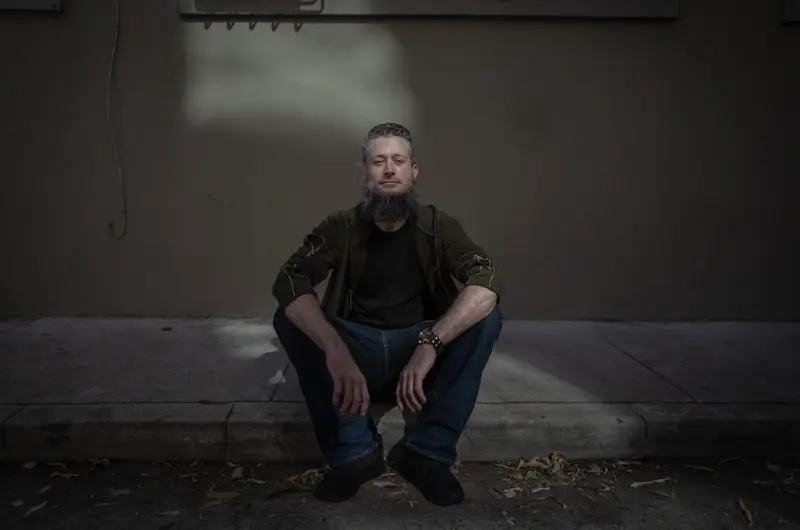
Lachenmyer said he filled out an application for permanent housing when he moved in about six months ago. He’s still waiting for approval before he can begin his housing search and said he holds out hope that his stay at the hotel will lead to permanent housing. As for the long wait, Lachenmyer said, “I’m OK with it. People have waited for years.”
But longtime resident Bucher said he is not as optimistic that his new Inside Safe neighbors will find permanent housing.
“All they’re doing is warehousing people,” he said. “Nobody thinks about anything but getting them off the streets.
Nov. 17, 2023: This story originally misstated the number of people living on the streets. There are 46,000 homeless people in the city of Los Angeles, but 32,700 live on the streets, as opposed to shelters or temporary housing, according to this year’s count by the Los Angeles Homeless Services Authority.
